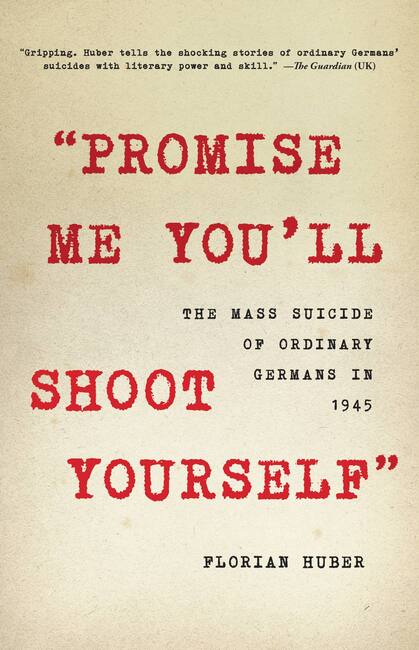Book Review: Promise Me You’ll Shoot Yourself by Florian Huber

This was not a good book to read before bed! I knew this was probably going to be the case, but I ignored my better judgment since I wanted to read it and I don’t have time during the day. The suicide epidemic of post-World War II Germany is not light reading. Fascinating though.
Florian Huber (in Imogen Taylor’s translation) describes the grisly acts in vivid detail, but with a matter-of-fact restraint that, from what I understand, captures the matter-of-fact perspective that many of these regular German people took toward the process and final act of ending their own lives and the lives of their spouses and children.
I’d only previously heard of how the Goebbles family poisoned their kids in Hitler’s bunker, and wasn’t at all familiar with the widespread suicide epidemic, but it doesn’t surprise me that it happened. It sounds like there were a few main categories of suicides:
- Those who wanted to avoid the atrocities being perpetrated by Soviet soldiers as they swept west through Germany.
- Those who were skeptical of the future and believed they would suffer such oppression that they would not be able to provide even the bare minimum for their families.
- Those who were part of the Nazi regime, who either couldn’t imagine a world without National Socialism or who wanted to avoid the punishment they knew was coming to them.
The book follows several people based on memoirs they’d written about that time, but the first half of the book focuses on the suicide epidemic, and the second focuses on the lead-up to World War II. It details how Hitler came to power and how basically everyone got swept up by Nazi propaganda, how they began to overlook or fail to object to the everyday persecution (no concentration camps yet) committed by the party against their Jewish neighbors.
If Erik Larson’s book In the Garden of Beasts is an American’s take of 1930s Germany, this book is its counterpoint from a German’s point of view that extends to the post-war era. It’s an affecting, insightful view of complicity and guilt and shame.
Current news outlets and social media have drawn comparisons between Nazi Germany and America’s turn toward right wing extremism. It’s pretty difficult not to. This book, published in 2019, doesn’t comment on Trump’s first term, but the description of Germany’s trajectory feels so on-the-nose with respect to 2024 America.
How far might the US follow 1920s and 1930s Germany’s path? No matter how far it does go, what might contrition look like on the other side? I suspect America isn’t much for apologies, but I don’t even know what I, personally, would view as satisfying penance for people who voted Trump into power a second time. We’re all complicit to some extent, but I point the finger at them more than at anyone else, and I have to believe that Americans will come around one way or another. I don’t want people to kill themselves, but I’d like to believe that one day the country can feel collective regret about this period of history and that it won’t take a World War III to get there.